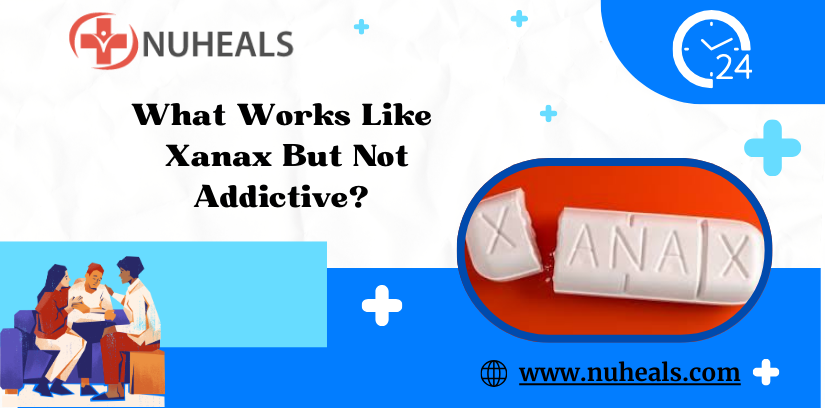For treating anxiety, Xanax is a well-known pill that is prescribed by most doctors. By promoting mental clarity and relaxation through a blend of relaxing substances, Xanax makes it easier to deal with everyday obstacles. But for its addictive properties, many people look for What Works Like Xanax But Not Addictive. In this article, we will discuss other options that will help you treat your anxiety.
What is Xanax, and why do people want to replace it
Xanax mainly provides quick relief from raised Anxiety. Xanax tablets are commonly known as Alprazolam. It can work to control the brain by reducing nervousness in the central nervous system. There is a significant chance of addiction, tolerance, and dependency with Xanax. There are a number of better choices available for people seeking comparable anxiety treatment without the risk of addiction. Because it has strong relaxing and enjoyable effects that could lead to misuse. More people are turning to non-addictive options that provide long-lasting relief without harming their well-being as mental health awareness rises.
Non-Addictive Alternatives to Xanax
Many of the above medications can be used for an extended period of time, but it’s still essential to discuss the possible advantages and disadvantages of each option with your doctor and inquire about any potential long-term health concerns. When it comes to treating anxiety, non-addictive medicine must be taken into account. Non-addictive drugs can handle symptoms of anxiety without risking addiction or reliance. For individuals who want the best treatment, one must know the advantages and significance of non-addictive anxiety drugs. To know what works like Xanax but not addictive, let’s discuss some of the non-addictive anti-anxiety drugs below.
Prescription Solutions for Anxiety Relief
- SSRIs:- SSRIs are less likely to be abused and have fewer long-term adverse effects. One of the first-line treatments for long-term anxiety disorders is SSRIs. Because SSRIs prevent serotonin from being recycled back into cells, there is more of the neurotransmitter available to affect the brain. Among other things, serotonin controls mood, libido, digestion, and sleep. Among the medication substitutes in this class for anxiety disorders are: Prozac, Zoloft, Citalopram, Lexapro.
- SNRIs:- SNRIs are a class of antidepressant drugs that function by raising serotonin and norepinephrine levels in the brain. Unlike Xanax, SNRIs have a slower onset of action and offer effective treatment without the potential for addiction that comes with benzodiazepines. These non-addictive anxiety drugs are effective long-term treatments because they reduce anxiety and enhance mood by regulating neurotransmitters.
- Buspirone:- One of the medicines, called Buspirone, works by activating particular serotonin receptors in the brain. It is frequently used to help reduce anxiety symptoms.
- Hydroxyzine:- Sometimes hydroxyzine is taken off-label to lessen anxiety, even though its main purpose is as an antihistamine. It is considered non-addictive and can provide temporary relief from the symptoms of anxiety.
- Beta-Blockers:- Propranolol and other beta-blockers are often prescribed to reduce the physical symptoms of anxiety, including shivering and a rapid heartbeat.
- Antidepressants:- A group of antidepressant medicines called selective serotonin reuptake inhibitors (SSRIs) can be beneficial in the treatment of anxiety disorders. The pills are believed to be non-addictive and work by regulating serotonin levels in the brain
Natural Alternatives for Treating Anxiety
1. Herbal Supplements:-
Herbal supplements for anxiety aim to boost the body’s natural processes and encourage calmness without the negative consequences that are frequently connected to prescription drugs. It’s necessary to remember that not everyone can benefit from herbal supplements, and speaking with a healthcare provider is advised, particularly if you are using medication or have underlying medical conditions.
- Ashwagandha
- Valerian Root
- Lemon Balm
2. Mindfulness & Meditation:-
In addition to being a useful relaxation method for panic disorder, mindfulness meditation can be a useful strategy for managing stress and anxiety. This meditation method can help you reduce negativity, slow down your racing thoughts, and relax your body and mind.
3. Physical Activity:-
One of the best and easiest natural strategies to deal with anxiety is to be physically active. Frequent exercise improves general mental health, lowers stress, and controls mood.
Types of exercise are:-
- Aerobics
- Yoga and Stretching
- Mindful Movement
4. Nutritional Diet:-
A nutritious, well-balanced diet can help control brain chemistry, stabilize blood sugar, and relieve anxiety symptoms. Although nutrition is not an effective treatment for anxiety, it is an important tool for naturally regulating it. Key Nutrients for Reducing Anxiety:-
- Magnesium
- Probiotics
- Tryptophan
- Vitamin B
How to Reduce Anxiety Without Dependence
Authorise people to look for anti-anxiety relief without turning to medication. This helps produce useful methods. You will find verification-based strategies that carry mental well-being, such as observation, cognitive-behavioral, and lifestyle modifications.
Final Thoughts On What Works Like Xanax But Not Addictive
Formulated with natural elements that imitate the calming effects of Xanax, this solution offers a safe alternative for those who need to manage stress and anxiety effectively. You will stimulate relaxation, enhance mood, and support mental clarity that will help you navigate daily challenges with ease.
Frequently Asked Questions (FAQs)
What is the best non-addictive anti-anxiety medication?
The most effective non-addictive anti-anxiety drug frequently varies depending on the health profile, underlying reason for the anxiety, and individual symptoms. which are useful but have a dependence risk, are typically not included in non-addictive choices.
Can anxiety be successfully controlled with natural supplements?
Yes, several natural substances have demonstrated potential in lowering anxiety, particularly for mild to moderate cases. Among the most well-liked are:
- L-Theanine
- Magnesium
- Ashwagandha





